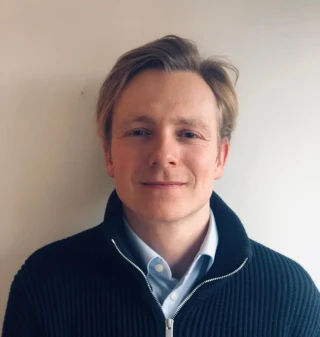The Circular Industries Talks are organized every second Wednesday at the Circular Industries Hub. In this edition, Roelof Stam, a researcher at the Clingendael International Energy Programme (CIEP) discusses the changing role of ammonia in Northwest Europe, in his talk, titled: Relaunching ammonia from fertilizer to energy carrier in Northwest Europe. Curious for more? Take a look at the recording at the bottom of this page.
“The existing infrastructure and demand from the fertilizer sector are key reasons why approximately 85% of current hydrogen export projects focus on ammonia as carrier.”
Roelof Stam discussed the changing role of ammonia in Northwest Europe, emphasizing its dual function as a traditional feedstock for nitrogen fertilizer and as an increasingly recognized energy carrier due to its hydrogen element and low carbon fuel. Roelof presented the results of his latest publication ‘Relaunching ammonia from fertilizer to energy carrier in Northwest Europe’.

He mentioned the following key takeaways. First of all, the 2022 energy crisis has caused a permanent reduction in ammonia production capacity in Northwest Europe. The interrelation between ammonia production and other industries is significant and often not well understood by policymakers. Secondly, the regions ammonia import capacity needs substantial expansion to make a meaningful contribution to energy import. While it’s commonly assumed that conversion to hydrogen should occur near the port of arrival, strategic considerations for hinterland countries, port space limitations, ammonia’s superior volumetric energy density, and energy savings that come with bypassing conversion, are compelling reasons to convert later in the supply chain or not at all. Thirdly, ammonia storage tanks present a promising supplementary solution in meeting future energy storage needs. Underground ammonia storage is possible but further research is necessary to better understand geochemical reaction in reservoirs and safety risks. Fourthly, ammonia is regarded a promising fuel for ships and possibly power plants for flexible supply. It remains to be seen how competitive ports in Northwest Europe will be compared with bunkering ports that have access to cheap renewables. In the electricity sector, strict EU regulations pose a barrier to widespread ammonia use. Fifthly, the ammonia market is changing both from the supply as well as the demand side, Fertilizer producers in Northwest Europe are under considerable pressure to reinvent themselves to stay competitive.
Curious about the whole story? Listen to Roelof in the Circular Industries talks.
The Circular Industries talks
The goal of the Circular Industries talks is to share knowledge across Leiden, Delft and Erasmus and to complement and deepen the knowledge already available within the Circular Industries Hub. The talks are organized on Wednesday morning from 10:00 to 11:00. The talks are online (Microsoft Teams).
